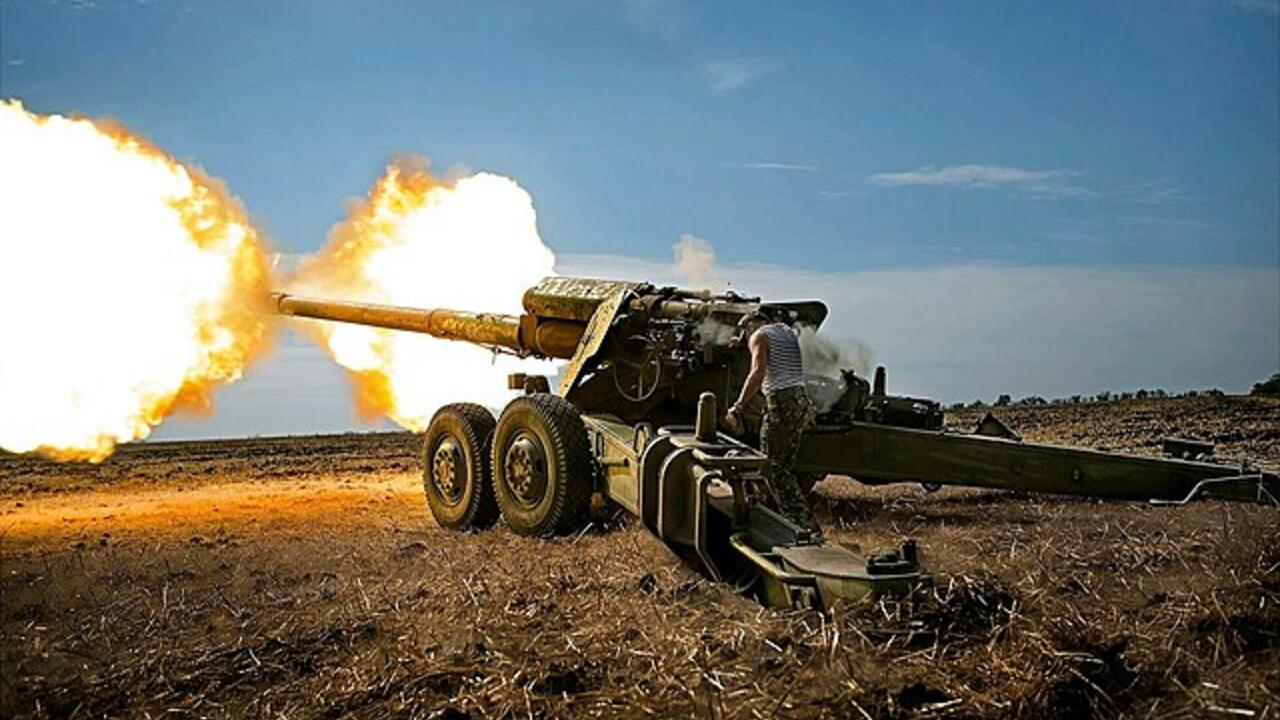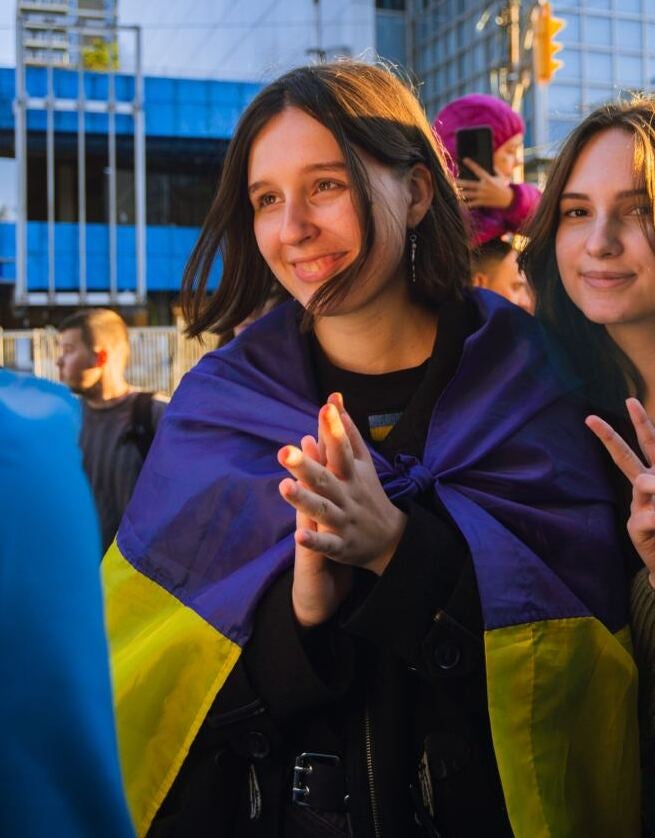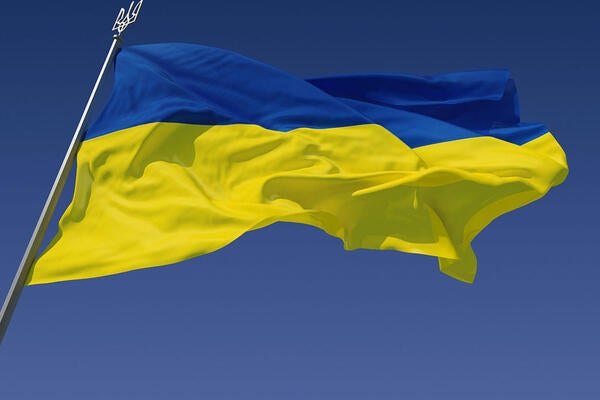
Out of the fire
Displaced Ukrainian students get a second chance at post-secondary education thanks to UWaterloo summer school program

Displaced Ukrainian students get a second chance at post-secondary education thanks to UWaterloo summer school program
By Sam Toman Manager, Executive CommunicationsMarianna Iovenko remembers the fight for survival leading up to her departure from Ukraine, as Russian bombs were hunting civilians in Kyiv.
“We sat in complete darkness after 5:00 p.m. because it was important to hide anything that could shed some light. We only had a TV with news about war, thoughts that war would end soon—hopefully—and some food that we managed to find in a nearby store when it was difficult even to buy bread.”
Now, after months of displacement, uncertainty, and confusion, she is safe and sound on the University of Waterloo campus. Iovenko, and 36 fellow Ukrainian students, are here for the Summer Program for Students from Ukraine. The all-faculty initiative led by Engineering and Mathematics, gives student-refugees a chance to continue studies disrupted by Russia’s brutal war on the country.

Her journey from war-ravaged Ukraine to the relative safety of UWaterloo was not an easy one. She spent months alone in Germany as a refugee, before moving to Toronto this September. She was safe, but felt helpless. “I had to live there with my anxious thoughts about my parents still in Ukraine."
Before the full-scale invasion, Iovenko was on-track to obtain a master’s degree in law at the National University of Kyiv-Mohyla Academy, pass the bar, then finally fulfill her dream of becoming an attorney at a law firm she was articling at.
“But all of that was destroyed,” she says.
Unsure of what to do next, everything changed when one of her professors sent her a link to Waterloo’s program. As part of the Students at Risk program, it offered four months of study to get what she needed to take the next step in her career.
Spearheading the program are two champions in the Faculty of Engineering: Dean Mary Wells, and Serhiy Yarusevych a Ukrainian-Canadian Professor in Mechanical and Mechatronics Engineering.
“My hope for initiatives like the summer internship program for Ukrainian students is that they will continue to provide opportunities for education and personal development, foster cross-cultural understanding and empathy, and inspire action towards a more peaceful and just world,” says Wells.
For her, the program has many benefits both for Ukrainian students affected by the conflict and for the University of Waterloo. The program provides valuable educational and work experience opportunities for those who have been impacted by the conflict, while demonstrating there are organizations willing to support them during difficult times. It also offers space for international collaboration and potentially opens doors for future academic partnerships and opportunities for collaboration.
“I think another benefit of the program is in raising awareness and understanding about the situation in Ukraine. This can help break down cultural and language barriers, ultimately promoting cross-cultural understanding across Waterloo.” she says.
Yarusevych’s motivations are similar and come from a deeply personal place. As a Ukrainian-Canadian, and an academic, he felt it was his duty to help in the way he knew how.
“Since Russia’s full-scale invasion, students, faculty and staff on campus came together at the grassroots level in search of different ways to help millions of Ukrainians in need. This program is the culmination of an incredible amount of advocacy that has led to a paradigm shift on campus, paving the way to such an amazing university-wide initiative,” he says of the program which also ran last summer under the direction of Managing Director of Waterloo Artificial Intelligence Institute Harold Godwin.
This summer Yarusevych has taken over from Godwin with a goal of mounting and running a fully integrated program from the ground up. It is an incredible amount of work on top of his role as a professor.
“In some ways, I wish we didn’t need a program like this, but the war displaced close to 15 million people in a matter of months, many of them students,” he says. “We cannot help all of them at Waterloo, but providing this unique opportunity to continue studying is a life-changing experience for these 37 students and is worth every effort. Their experiences at Waterloo go far beyond academics and can be truly life changing.”
That exchange goes both ways. Not only is it a chance for Ukrainians to meet members of a diverse student, staff, and faculty community, but it’s also an opportunity for the institution to lay a foundational blueprint for support for other communities when violent conflict of this magnitude impacts our global community.
“This is what resiliency and optimism look like despite dire circumstances,” adds Wells. “We saw our colleagues open their hearts and their minds to the Ukrainian students. This was not just in Engineering but across the University. Without everyone helping, from United College to Renison, to the GSPA, to Waterloo AI to Advancement and faculty members, all these people and offices played an integral and important role to allow this initiative to be successful.”
Of the students who participated in the summer 2022 program, nearly all sent letters thanking the institution for its role in helping them continue their studies. However, many left with mixed feelings. Some felt guilt that they were chosen and not others as well as a sense of obligation.
“The program raised complex social topics within the academic community related to war and refugees and how it affects each of us,” wrote one student from the 2022 program.
“Every person has the right to education, safety, and life,” they said, asking to remain anonymous. “I understand that plans are to expand the current program not only to Ukrainians but also to other nationalities affected by oppression and repression, thus showing that every person deserves a chance for a better future, through access to education as education changes the world.” It was a sentiment echoed by multiple 2022 participants, and by Yarusevych.

As a representative on the university-wide Scholar's at-risk committee, he hopes that "this year's program will serve as a blueprint for a recurring program on campus open to scholars at risk from around the world."
Iovenko, who is now in her first week of the 2023 program agrees. “I think that academia promotes that everyone can make a change if one desires to do that. Academia offers almost unlimited tools and support without discrimination, providing valuable experience. For many Ukrainians, academia is one of the limited sources of integrity and belonging, especially when forcibly relocated due to the invasion.”
When the war is over, and Ukrainians begin rebuilding their shattered communities and lives, there will be an incredible amount of work to be done. Undoubtedly, this process will involve accountability for numerous atrocities and war-crimes committed by the occupying Russian forces in Ukraine, including countless acts of torture, rape, and murder of civilians and prisoners of war.
Iovenko hopes that her experience at Waterloo can help in that reconstruction by offering justice to those impacted.
“I am interested in human rights protection and working with female victims of wartime sexual violence to assist them legally in terms of securing stable criminal justice procedures and promoting better post-war rehabilitation for them,” she says. “I want to grab as many academic opportunities as possible to be better prepared to help Ukraine in the future.”
More facts about the Summer Program for Students from Ukraine

Sunset in Khartoum, Sudan — photo by Ahmed Rabea
Read more
We stand in solidarity with those who have been, and who continue to be, affected by the violence in Sudan

Read more
Iranians and Ukrainians join forces on the University of Waterloo campus to fight for democracy

Read more
What risks do NATO members take in increasing military assistance to Ukraine?
The University of Waterloo acknowledges that much of our work takes place on the traditional territory of the Neutral, Anishinaabeg, and Haudenosaunee peoples. Our main campus is situated on the Haldimand Tract, the land granted to the Six Nations that includes six miles on each side of the Grand River. Our active work toward reconciliation takes place across our campuses through research, learning, teaching, and community building, and is co-ordinated within the Office of Indigenous Relations.